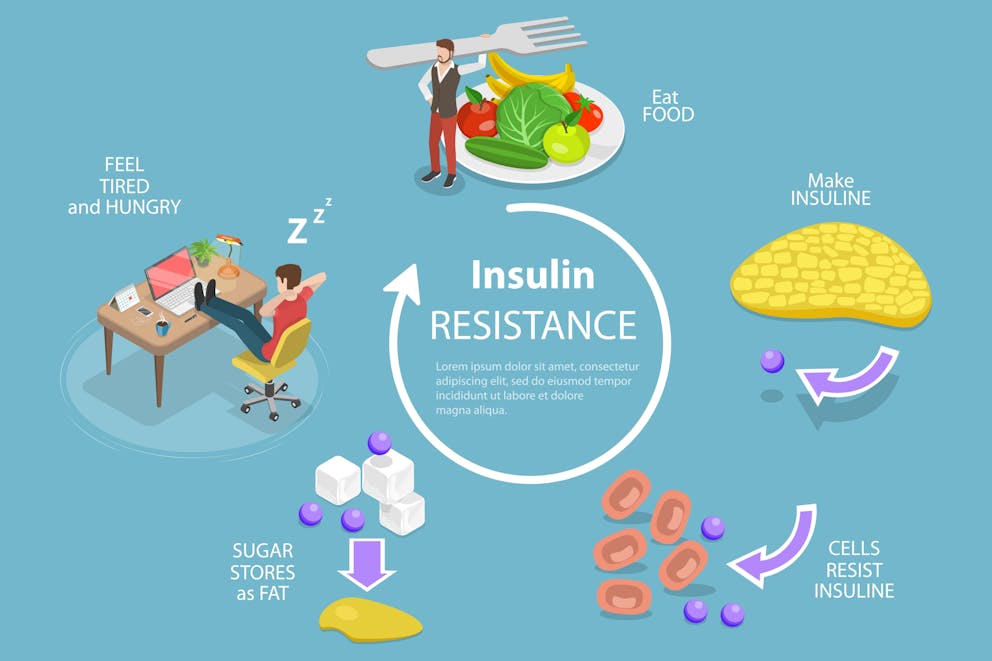The 5th Body Type Revealed
Understanding if you show characteristics of the fifth body type, the pancreas type, can help you make the proper dietary and lifestyle choices to promote a healthy body.
This hormonal body type is predominantly caused by insulin resistance and other factors that impact metabolic processes and body composition.
Discover the characteristics of the pancreas body type and how it differs from other body types, such as the adrenal, ovary, or thyroid body type, explore triggers for various body types, and discover the underlying hormonal imbalances.
The 5th Body Type - Pancreas Type
The pancreas' body type is characterized by high insulin levels, typically caused by insulin resistance.
This body type is associated with a diet high in processed foods, sugars, refined carbs, vegetable oils, and monosodium glutamate (MSG) and is linked to frequent eating and snacking.

Insulin Resistance and Its Impact on the Pancreas Body Type
Insulin resistance occurs when your cells do not respond appropriately to the hormone insulin, which regulates blood sugar levels. As a result, your pancreas produces more insulin to compensate for the lack of cellular responses.
Over time, increased insulin production leads to weight gain, especially around the abdomen, and increases the risk of other health complications associated with insulin resistance.
Common Triggers for Developing a Pancreas Body Type
Here are common dietary factors linked to a pancreas body type:
Sugar: Consuming excessive amounts of sugar leads to increased blood glucose levels requiring higher insulin secretion from the pancreas.
Refined Carbs: Foods like white bread or pasta have been stripped of their nutrients and fiber content and quickly break down into simple sugars upon digestion causing rapid spikes in blood glucose levels, leading to excessive insulin production.
Vegetable Oils: These oils are high in omega-6 fatty acids that promote inflammation within the body which may contribute towards impaired pancreas function linked to insulin resistance.
Frequent Eating: Constant snacking throughout the day keeps your blood sugar elevated, resulting in continuous demand for pancreatic activity, which can lead to pancreatic exhaustion or dysfunction associated with a pancreatic body type.
It is essential to address the underlying triggers to prevent or reverse these effects of a pancreas body type. To improve insulin sensitivity and overall health, following a low-carb diet like Healthy Keto® and incorporating intermittent fasting is crucial.
A nutritious high-fat diet and time-restricted eating can aid in regulating blood sugar levels, which keeps insulin levels balanced. This supports weight loss and improves various health markers associated with this specific body type.
Triggers for Other Body Types
Identifying what contributed to specific body types is crucial in determining how to reverse them.
Factors like stress, sugar intake, medication use, exposure to viruses, or estrogen can all contribute to different body types such as adrenal (stress-related), liver (alcohol-induced), ovary (estrogen-dominant), or thyroid (secondary issues).
This section will discuss the triggers and effects of these various body types.
Adrenal Body Type Triggers and Their Effects
The adrenal body type is characterized by weight gain around the midsection due to high cortisol levels resulting from chronic stress.
Common triggers include long-term emotional stressors, lack of sleep, over-exercising, and excessive caffeine consumption. These factors lead to an imbalance in cortisol production, which can cause fatigue, mood swings, and increased abdominal fat storage.
Liver and Thyroid Body Type Connections with Other Underlying Conditions
Liver body type is associated with weight gain around the abdomen due to poor liver function caused by alcohol abuse or a diet high in processed foods. Impaired liver function leads to difficulty processing toxins, which may result in bloating and fluid retention.
On the other hand, the thyroid body type involves overall weight gain. It is typically linked to secondary issues related to thyroid gland dysfunction, such as Hashimoto's disease or iodine deficiency. Environmental factors like radiation exposure can also contribute to thyroid dysfunction.
Hormonal Imbalances Linked to Ovary Body Types
The ovary body type is characterized by weight gain around the hips and thighs due to estrogen dominance.
Common triggers for this hormonal imbalance include exposure to xenoestrogens (chemicals that mimic estrogen) found in plastics, pesticides, and personal care products; birth control pill usage; or hormone replacement therapy.
These factors can lead to symptoms such as heavy periods, mood swings, and increased fat storage in lower body areas.
Hormones and Their Effects on Body Types
Understanding the various body types requires recognizing the role of hormones in influencing body composition. High levels of cortisol, estrogen, and insulin can result in unexplained weight gain due to their role in energy production and fat storage.
These hormones can also cause secondary issues with other organs like the thyroid gland or liver function, which may result in various health complications.
How Stress and Cortisol Affect Weight Gain
Cortisol, often called the "stress hormone," is released by your adrenal glands during stress. It helps regulate blood sugar levels and maintain energy balance throughout your body.
However, when you're constantly under stress and cortisol levels remain elevated for extended periods, this hormone can significantly contribute to weight gain - particularly around your midsection.
High cortisol levels also suppress immune system function and increase inflammation, explaining why adrenal body types are prone to infections and inflammatory diseases.
Estrogen's Role in Promoting Fat Storage Around Hips and Thighs
Estrogen, one of the primary female sex hormones responsible for regulating menstrual cycles and maintaining pregnancy, has been found to promote fat storage around the hips and thighs - an area commonly associated with a pear body shape.
This occurs because estrogen receptors are more concentrated in these regions than elsewhere in women's bodies. Excess estrogen production or exposure through environmental factors (such as xenoestrogens) can lead to unwanted weight gain and increased risk for certain cancers, including breast and ovarian cancer.

Insulin Resistance Leading to Increased Belly Fat
Insulin is a hormone the pancreas produces that helps regulate blood sugar levels and controls energy-making processes and fat storage.
Insulin resistance, triggered by factors like a high-carb diet and a sedentary lifestyle, leads to higher insulin levels in your bloodstream. This condition has been linked with increased belly fat - a characteristic of the apple body shape.
High insulin levels also contribute to inflammation and other health issues like heart disease and diabetes.
To effectively address insulin resistance, it’s crucial to limit carbs and sugars, regularly exercise, and incorporate intermittent fasting into your routine.
This promotes balanced blood sugar and insulin levels and has been found to reverse insulin resistance and associated weight gain and significantly lower the risk of diabetes.
Uncovering Your Unique Trigger Event
Understanding the root cause of your specific body type is essential for addressing it effectively and making necessary lifestyle changes.
You can take this body type quiz to understand better how your hormones may shape your metabolic health and body composition.
In this section, we will discuss how to analyze your personal history and help to identify if you show characteristics of one of these five distinct body types.
Potential Causes Associated with Different Body Types
Common triggers and underlying causes can contribute to developing a specific body type.
Surgery or trauma: Major surgeries or traumatic incidents can disrupt hormonal balance, including excessive cortisol, linked to weight gain and the development of an adrenal body type.
Pregnancy or birth control pills: Hormonal fluctuations during pregnancy or while using contraceptives can contribute to an ovary (estrogen-dominant) body type.
Alcohol consumption habits: Excessive alcohol intake may result in liver-related issues leading to a liver body type.
Dietary choices: Consuming high amounts of sugar, refined carbs, vegetable oils, MSG, and frequent eating is typically linked to developing insulin resistance and a pancreas body type.
Why it’s Important to Address the Root Causes
Understanding what may have contributed to the development of your specific body type is crucial for reversing it and preventing future health complications related to hormonal imbalances and other underlying conditions.
By pinpointing these triggers in the early stages, it is possible to make tailored dietary and lifestyle modifications that can help to promote overall health and well-being.
For example, if stress is the primary cause of an adrenal body type, incorporating relaxation techniques such as deep breathing exercises, stretching, walking in nature, or gardening can help reduce stress and balance cortisol levels.
Similarly, addressing dietary choices for pancreas types may involve adopting a nutritious, low-fat diet like Healthy Keto® and practicing intermittent fasting to combat insulin resistance.
Reversing Your Body Type through Lifestyle Changes
By identifying and addressing the underlying causes that led to a specific body type, individuals can make targeted lifestyle changes such as reducing stress levels, improving diet quality, or eliminating exposure to environmental toxins to promote hormonal balance and improve well-being.
Strategies for Managing Stress-Related Adrenal Body Types
If you have an adrenal body type, managing your stress levels effectively is crucial. Some proven techniques include:
Stress management techniques include deep breathing exercises, gentle exercise, stretching, or walking in nature.
Maintaining a regular sleep schedule and ensuring adequate rest each night.
Focusing on a balanced diet rich in nutritious whole foods while limiting processed foods high in sugars, carbs, and trans fats.
Dietary Adjustments Tailored Towards Liver and Pancreas Types
Liver and pancreas types should focus on making dietary adjustments that support healthy liver function and can improve insulin sensitivity. Consider implementing these changes:
Avoiding refined carbohydrates, sugars, vegetable oils, and alcohol are known triggers of insulin resistance in pancreas types.
Follow a nutrient-rich low-carb diet such as Healthy Keto and incorporate intermittent fasting into your daily routine.
Conclusion
In conclusion, understanding the 5th body type, the pancreas type, and its triggers can help individuals make targeted lifestyle changes to improve their health.
Hormonal imbalances significantly shape your body composition and type and can impact how and where your body stores fat. A low-carb ketogenic diet and intermittent fasting are excellent choices to manage and even reverse insulin resistance linked to a pancreas body type.
FAQs
1. What are the five body types?
The five body types include the adrenal, liver, thyroid, ovary, and pancreas body type. Each type is characterized by specific hormonal imbalances that determine how and where the body stores fat and may increase the risk of future health problems.
2. How does the pancreas body type differ from others?
The pancreas body type is characterized by high insulin levels, often caused by insulin resistance resulting from a diet high in processed foods and sugars. Unlike other body types, it specifically relates to imbalances in insulin production and sensitivity, influencing fat storage patterns and metabolic health.
3. Why is it important to know your body type?
Understanding your body type is crucial as it helps tailor dietary and lifestyle choices to address specific hormonal imbalances, promoting overall health and well-being. By identifying and addressing the root causes associated with your body type, you can make targeted lifestyle modifications to prevent future health complications related to hormonal imbalances.
Previous blog
Sun Reduces Stress and Belly FatNext blog
What Are Electromagnetic FieldsTags

Popular
08/21/2024
55.7K views
02/23/2025
46.8K views
11/18/2024
281.1K views
03/18/2024
11/21/2022




